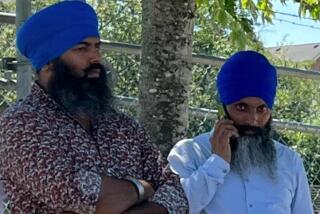Iraq’s Top Shiite Cleric Survives Purported Attack
- Share via
BAGHDAD — The foremost Shiite Muslim cleric in Iraq reportedly survived an assassination attempt Thursday, but details were murky and it was unclear how serious the incident might have been.
Statements by Grand Ayatollah Ali Sistani’s office were contradictory -- at least one confirmed the attack, but others later denied it.
U.S. officials said they had investigated the reports and concluded that no attempt took place. “It’s false; there was no such attempt,” a U.S. official said. “We think the story is wrong.”
However, a member of Iraq’s Governing Council and a top aide to another council member said they had been told that Sistani had been targeted by assassins.
Mouwafak Rabii, a Shiite member of the council, said sources told him that there had been an assassination attempt but Rabii said he saw Sistani afterward and the 75-year-old cleric was “fine and in good health.”
Abdul Adel Mehdi, a top aide to Abdelaziz Hakim, another Shiite council member, confirmed that in a meeting Thursday “we were briefed that there was an attempt on the life of Ayatollah Sistani, an attempt to assassinate him. But I don’t know whether his attackers were caught.” Mehdi added that the people who told him had direct contact with Sistani’s office.
Sistani, he said, was alive and “now in a safe place.”
The two Governing Council sources indicated that the attack occurred Thursday morning in the holy city Najaf, about 100 miles south of Baghdad.
Sistani lives and works in the heart of the city in modest quarters along a narrow alley. He rarely, if ever, leaves his home because of fears that he will be assassinated. He and his son, who is his closest aide, were targets of at least one assassination attempt, in 1996.
Still, Sistani and many other Shiite clerics maintain an open-door policy so that any of the faithful can come to make an appointment or consult about problems great and small. The line outside Sistani’s office often winds around the corner.
As the foremost religious leader of Iraq’s Shiites, who account for at least 60% of the population, Sistani has pushed for elections to choose a transitional government that would take over at the end of June. In January, tens of thousands of Shiites took to the streets to back his call for elections.
But American officials and some of Iraq’s Sunni Muslims, Kurds and other groups say the country is unprepared for elections and that it should stick with a U.S.-backed plan to choose the transitional government using a caucus system.
Thursday’s reported attack on Sistani came on the eve of the arrival of a team of United Nations election experts who are expected to determine whether the country is ready to hold elections.
Regardless of whether the assassination attempt is confirmed, the report seems certain to send shock waves through the Shiite population, with many likely to blame Sunnis antagonistic to Sistani. Rabii urged fellow Shiites on Thursday not to engage in a “backlash” against Sunnis.
Aside from Sunni-Shiite tensions, intra-Shiite rivalries could also have fueled an assassination attempt. And other people are likely to blame the Americans, because they have disagreed with Sistani about the viability of holding elections.
Elsewhere Thursday, anti-coalition insurgents lobbed a mortar shell at a checkpoint near Baghdad’s airport, killing one American soldier and wounding another, the U.S. command said. The attack brought to 529 the number of U.S. troops killed in Iraq, according to an Associated Press tally.
In northern Iraq, Kurdish leaders convened the parliament in their autonomous zone in a show of unity after Sunday’s double suicide attacks on two political party offices in Irbil that killed 109 people.
In an Internet posting Wednesday, a group called Jaish Ansar al Sunna claimed responsibility for the bombings. The group also claimed responsibility for Saturday’s car bombing in Mosul that killed nine.
Brig. Gen. Mark Kimmitt said the U.S. military believes Jaish Ansar al Sunna is a splinter group of Ansar al Islam, a radical Iraqi group that American officials have said is linked to Al Qaeda.
More to Read
Sign up for Essential California
The most important California stories and recommendations in your inbox every morning.
You may occasionally receive promotional content from the Los Angeles Times.













